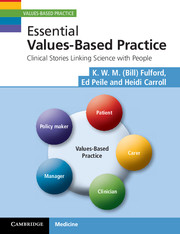Book contents
- Frontmatter
- Review quotes
- Contents
- Foreword
- Acknowledgements
- A bold claim to start this book
- Prologue: linking science with people
- Part 1 Values, individuals and an overview of values-based practice
- Part 2 The clinical skills for values-based practice
- Part 3 Relationships in values-based practice
- Part 4 Science and values-based practice
- 10 The reluctant hypertensive: think evidence, think values too!
- 11 Unexplainabl abdominal pain: think values, think evidence too!
- 12 Elective fertility: think high-tech, think evidence and values!
- Part 5 Bringing it all together
- Postcript: the small change of care
- A bold claim to end this book
- Appendix A Values-based practice summary and definitions of key terms
- Appendix B Values-based practice teaching framework
- Index
11 - Unexplainabl abdominal pain: think values, think evidence too!
Published online by Cambridge University Press: 05 June 2012
- Frontmatter
- Review quotes
- Contents
- Foreword
- Acknowledgements
- A bold claim to start this book
- Prologue: linking science with people
- Part 1 Values, individuals and an overview of values-based practice
- Part 2 The clinical skills for values-based practice
- Part 3 Relationships in values-based practice
- Part 4 Science and values-based practice
- 10 The reluctant hypertensive: think evidence, think values too!
- 11 Unexplainabl abdominal pain: think values, think evidence too!
- 12 Elective fertility: think high-tech, think evidence and values!
- Part 5 Bringing it all together
- Postcript: the small change of care
- A bold claim to end this book
- Appendix A Values-based practice summary and definitions of key terms
- Appendix B Values-based practice teaching framework
- Index
Summary
Topics covered in this chapter
This chapter discusses the Squeaky-wheel Principle and how it reminds us not to lose sight of the evidence when we are focusing on values.
Other topics include:
Targets and care – are the goals the same?
“Inappropriate” attendance and misuse of resources
Use of interpreters and the role of family
Intercultural medicine and varying patient expectations
The role of third-sector organizations.
Take-away message for practice
When you are focusing on values (ethical or otherwise), never lose sight of the evidence. So, think values, think evidence too!
The Squeaky-wheel Principle as we noted in Chapter 3 reminds us that values, although always there and important, tend to get our attention particularly when they cause trouble: it is, as they say, “the squeaky wheel that gets the grease.” This is an important reminder clinically because we are always at risk of losing sight of the evidence when the values are “squeaking” and hence grabbing our attention. Just as therefore the clinical bottom line of the last chapter was to “Think evidence, think values too!” so the clinical bottom line of this chapter is that it is equally important to “Think values, think evidence too!”
We illustrate the importance of “Think values, think evidence too!” with the story of a senior emergency care nurse, Matthew Cruickshank, and his problems with a non-English-speaking patient, Fatima Mahmood.
- Type
- Chapter
- Information
- Essential Values-Based PracticeClinical Stories Linking Science with People, pp. 143 - 150Publisher: Cambridge University PressPrint publication year: 2012



